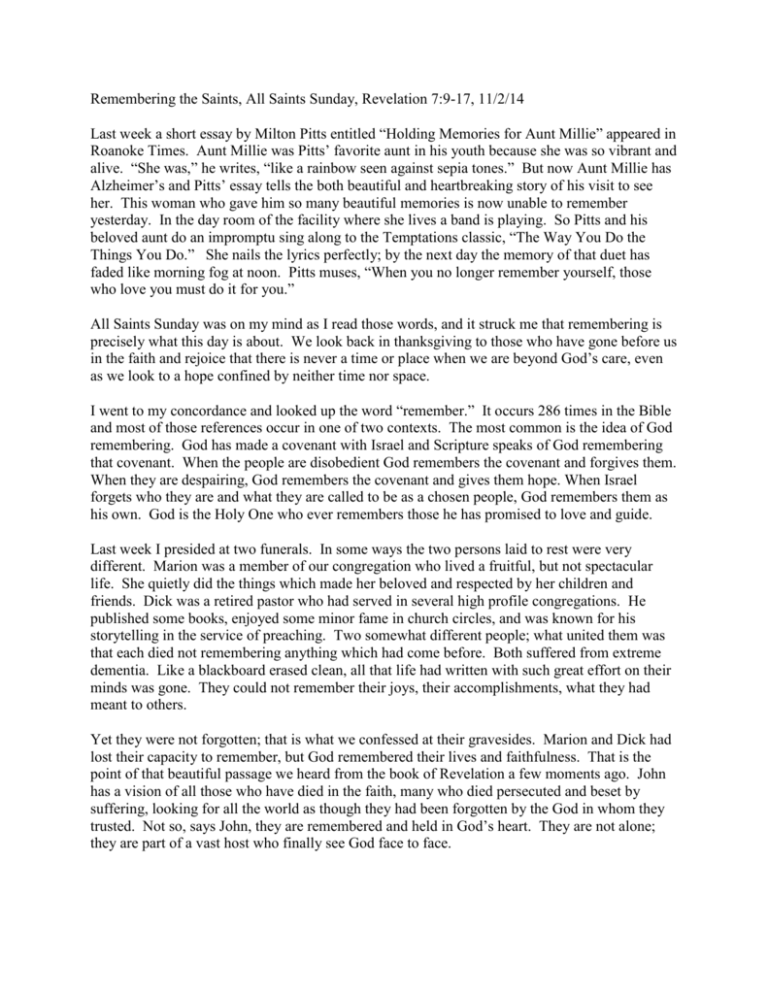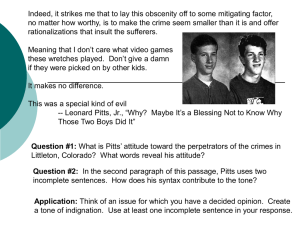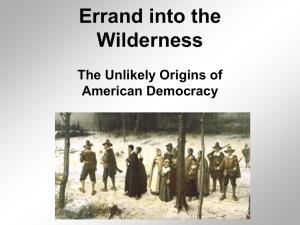Last week a short essay by Milton Pitts entitled “Holding Memories
advertisement

Remembering the Saints, All Saints Sunday, Revelation 7:9-17, 11/2/14 Last week a short essay by Milton Pitts entitled “Holding Memories for Aunt Millie” appeared in Roanoke Times. Aunt Millie was Pitts’ favorite aunt in his youth because she was so vibrant and alive. “She was,” he writes, “like a rainbow seen against sepia tones.” But now Aunt Millie has Alzheimer’s and Pitts’ essay tells the both beautiful and heartbreaking story of his visit to see her. This woman who gave him so many beautiful memories is now unable to remember yesterday. In the day room of the facility where she lives a band is playing. So Pitts and his beloved aunt do an impromptu sing along to the Temptations classic, “The Way You Do the Things You Do.” She nails the lyrics perfectly; by the next day the memory of that duet has faded like morning fog at noon. Pitts muses, “When you no longer remember yourself, those who love you must do it for you.” All Saints Sunday was on my mind as I read those words, and it struck me that remembering is precisely what this day is about. We look back in thanksgiving to those who have gone before us in the faith and rejoice that there is never a time or place when we are beyond God’s care, even as we look to a hope confined by neither time nor space. I went to my concordance and looked up the word “remember.” It occurs 286 times in the Bible and most of those references occur in one of two contexts. The most common is the idea of God remembering. God has made a covenant with Israel and Scripture speaks of God remembering that covenant. When the people are disobedient God remembers the covenant and forgives them. When they are despairing, God remembers the covenant and gives them hope. When Israel forgets who they are and what they are called to be as a chosen people, God remembers them as his own. God is the Holy One who ever remembers those he has promised to love and guide. Last week I presided at two funerals. In some ways the two persons laid to rest were very different. Marion was a member of our congregation who lived a fruitful, but not spectacular life. She quietly did the things which made her beloved and respected by her children and friends. Dick was a retired pastor who had served in several high profile congregations. He published some books, enjoyed some minor fame in church circles, and was known for his storytelling in the service of preaching. Two somewhat different people; what united them was that each died not remembering anything which had come before. Both suffered from extreme dementia. Like a blackboard erased clean, all that life had written with such great effort on their minds was gone. They could not remember their joys, their accomplishments, what they had meant to others. Yet they were not forgotten; that is what we confessed at their gravesides. Marion and Dick had lost their capacity to remember, but God remembered their lives and faithfulness. That is the point of that beautiful passage we heard from the book of Revelation a few moments ago. John has a vision of all those who have died in the faith, many who died persecuted and beset by suffering, looking for all the world as though they had been forgotten by the God in whom they trusted. Not so, says John, they are remembered and held in God’s heart. They are not alone; they are part of a vast host who finally see God face to face. From the moment we are claimed in baptism each of us is held in God’s memory. This is a word we can cling to when the tests come back scary, when the job is crushing us, when those we have loved find new ways to disappoint us, when the challenges of life makes us feel as insignificant as a single grain of sand in the desert. We are remembered and we are valued. I said that scripture uses the word “remember” in two major contexts. One is God’s remembrance, the other concerns gratitude. Paul, in particular, talks about remembering the kindness and faithfulness of those with whom he had ministered. When Paul remembers it is to acknowledge the debt he owes to others. Surely, gratitude should be a part of this All Saints Day. Our culture has an almost idolatrous admiration for the so-called self made man. But the truth is, the one who calls himself a selfmade man is either a liar or a fool. From the moment we are given our DNA we are dependant upon forces and people outside ourselves. We can not survive without the care and nurture of others. Scientists talk of standing on the shoulders of those who have gone before them and that is doubly true of us who confess Christ. We literally would not know the good news of Jesus unless others had cared enough to pass it on in word and deed from generation to generation. Of course we are thankful for the great heroes of the faith, the Luthers, the St Francises, the ML Kings. But think for a moment about your personal saints. Who taught you the basics of the faith? Who showed you how God’s love looks when it is embodied in a life? Who gave you forgiveness in Christ’s name when you knew you did not deserve it?....In the silence of today’s prayer of the church I invite you to let your gratitude become a prayer of thanksgiving. Feel free to speak that name aloud as we celebrate all the Saints both famous and personal. In The Great Divorce, C.S. Lewis employs the literary premise that souls can take a day trip on a bus to the edge of heaven to see if they really want to go there. The book is a series of encounters between enquirers (who appear as ghosts in heaven) and radiant Spirits who try to explain the nature of heaven. One ghost is a famous artist on earth and he is terribly concerned when a Spirit who was also an artist can not tell him if great painters like Cezanne are in heaven “But surely in the case of distinguished people you’d hear?” But they aren’t distinguished—no more than anyone else. Don’t you understand? The Glory flows into everyone, and back from everyone: like light and mirrors. But the light’s the thing.” “Do you mean there are no famous men?” “They are all famous. They are all known, remembered, recognized by the only Mind that can give a perfect judgment.” One must be content with one’s reputation among posterity, then,” said the Ghost. “My friend,” said the Spirit, Don’t you know?” “Know what?” “That you and I are already completely forgotten on the Earth.” This, my friends, is the paradox of All Saint’s Day, a Sunday which simultaneously faces finitude and proclaims our enduring value in God’s eyes. Despite our best efforts to deny it, life is fleeting and ruin is the fate of all flesh. Even the most famous are but a flute’s tone on the spring breeze, beautiful for a precious moment but soon forgotten. Yet, though our note is fleeting, the gospel song which began before us continues long after we play our part. And though memory of us may fade on Earth, we are held in love by the great composer of the cosmic symphony who remembers us into all eternity. Today we give thanks that we are remembered by God in all times and places. Today we give thanks for those who have translated confession into lives of mercy. Today we give thanks for all the saints who from their labors rest. May we rejoice in the knowing we are remembered by God and thus labor as faithfully as those who have committed the gospel treasure into our keeping.








